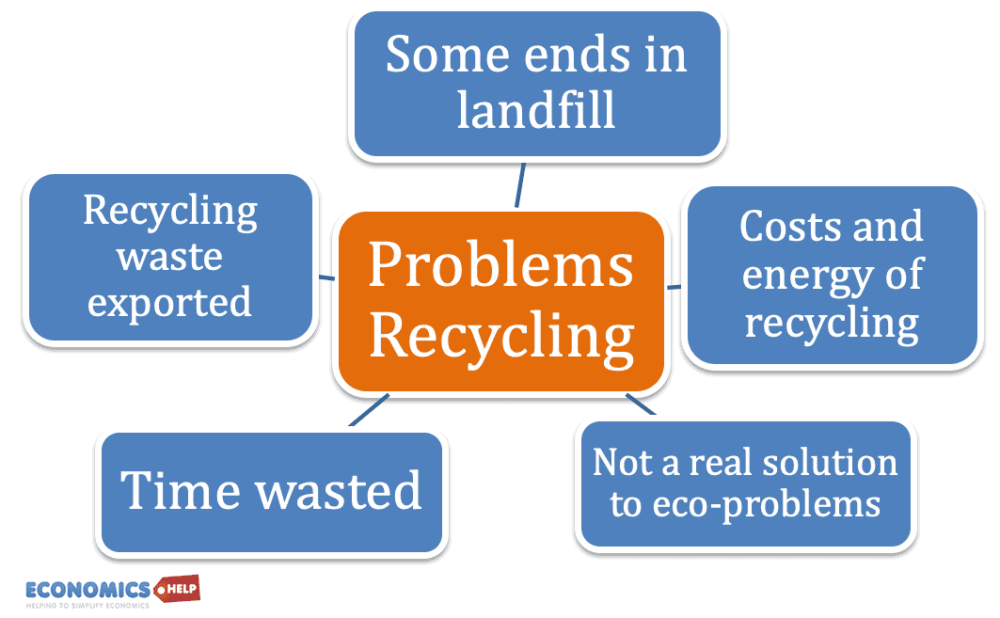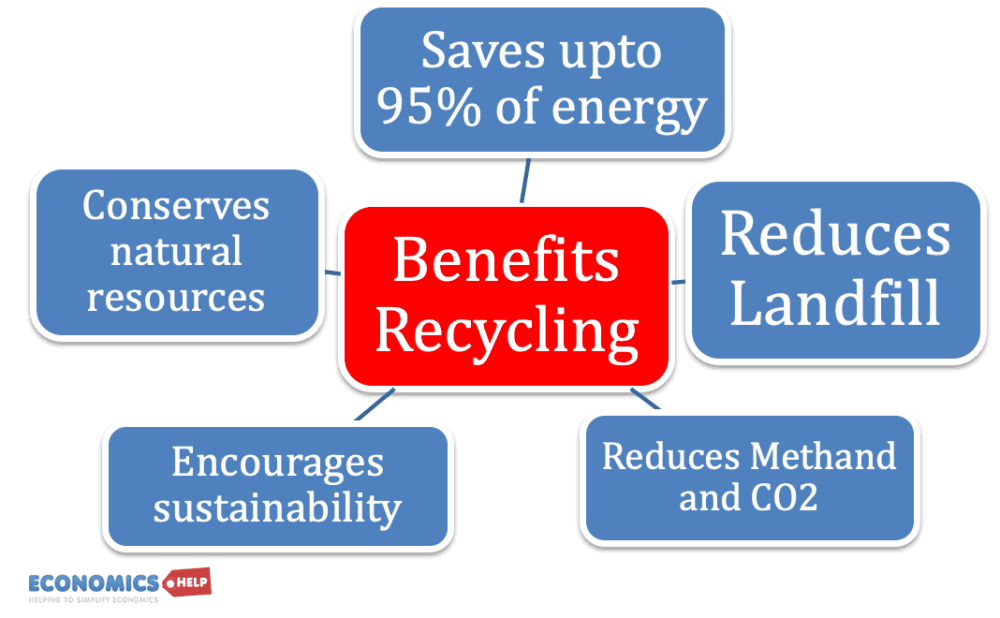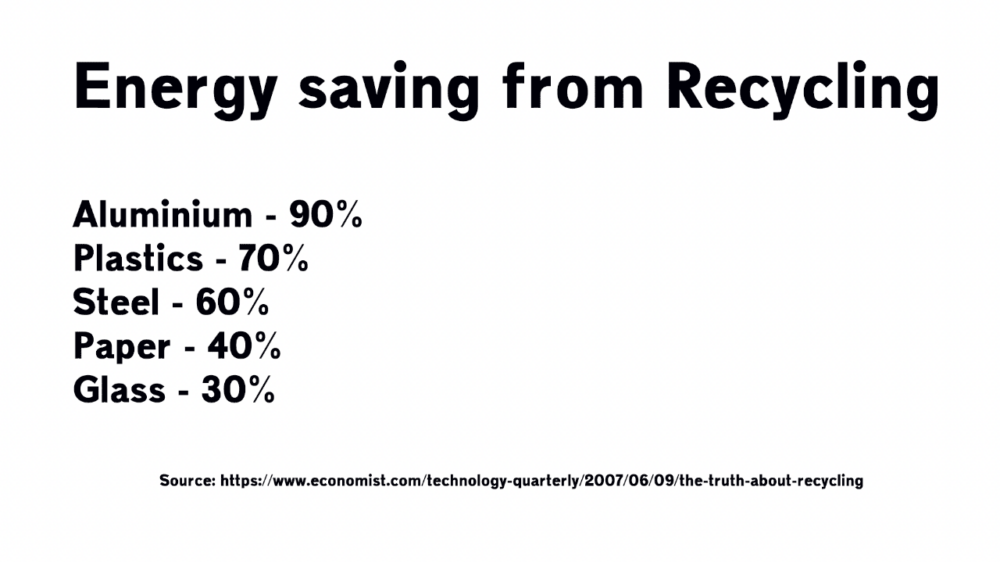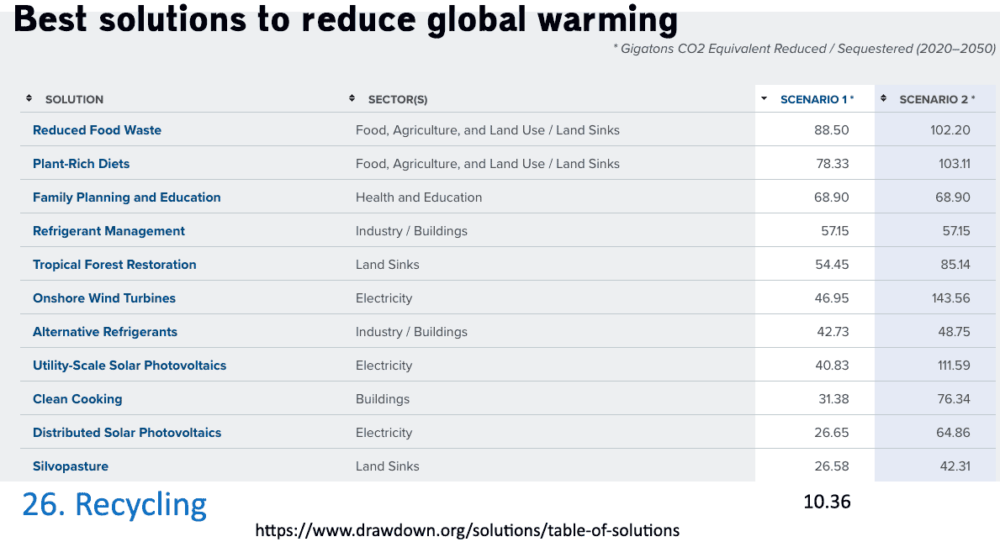Huge volumes of waste are sent to landfill every year. In 2018, the US created 292.4 millions tons of trash, of which nearly half 146 million tons ended in landfill. In recent years, much effort has gone into encouraging people to recycle, and rates of recycling have increased significantly (in the US from 9% (1980) to 32% (2018). However, just because it feels like a good thing to do, is it actually worthwhile for the economy and environment?
Video version
Costs of recycling

Recycling that ends up in landfill. The first problem is that all the products we diligently put in recycling boxes often ends up in landfill, either in UK/US or abroad in Asia. In 2017/18. Westminster council sent 82% of all household waste – including that put in recycling bins – for incineration (What really happens to your rubbish?) In the UK Latest figures show 525,000 tonnes of household recycling collected was rejected at the point of sorting in 2019/20, partly because households failed to adequately sort. (local.gov.uk) It is a similar story in the US, where waste put in recycling bins, can be difficult and expensive to deal with and so ends in landfill.
Recycling takes time and effort itself. Recycling aims to save waste, but the process itself uses resources. As a report by (NPR) stated “Recycling plastic is “costly,” and sorting it, the report concludes, is “infeasible.” The US only recycles around 5% of its plastic consumption, but as Jan Dell, founder of the Last Beach Cleanup, writes
“We don’t have factories to do it. It’s also very water intensive, so we’re not going to build more plastic recycling facilities in the US.” (Guardian)
Given water is an increasingly scarce resource, recycling plastic could do more harm to the environment than putting in a landfill.
Recycling green glass also gives a very poor return. You can recycle green glass, but it ends up as a fairly useless dull black substance called ‘cutlet’. It is usually more expensive to make new glass bottles from this recycled product rather than from raw product – sand. Putting glass in landfill is actually quite harmless as it eventually decomposes to sand. Carl Munger claims that in some US cities, citizens are forced to recycle glass bottles, these bottles are then picked up by recycling trucks to a recycling facility, which is then taken in another truck to landfill. This stems from a desire to recycle. But Munger claims
“In effect, citizens are paying the city extra to throw away the glass, so that they can pretend it’s being recycled.” (Cato Unbound)
This problem is exacerbated in the UK which is a big net importer of wine and so has more supply of green glass than demand. The point is that not everything is worth recycling as the time and effort are greater than any benefits.
Energy used in the recycling process. There is also the business of collecting waste and taking to recycling centres. This in itself uses energy and resources, and more vehicle pollution from the recycling lorries.
Time wasted. The costs of recycling include the time and space required by householders and firms to sort the waste. Steven Landsburg in the Armchair Economist claimed recycling is a waste of time because the benefits are small, but the householder faces a time cost of collecting the resources. If we spend one hour a week on sorting and putting out the recycling, then if we value an hour of labour at $25 the costs of recycling are greater than perceived. He also claimed recycling paper may lead to fewer trees being planted, which is bad for the environment.
Over-supply A few years ago, recycling became a victim of its own success, with a large increase in the supply of recyclable plastic flakes causing the price to fall and it soon became uneconomical to go through the process of recycling. Councils who encouraged us to recycle were having to send all these so-called ‘recyclable’ materials straight to landfills. There was too much to usefully use.
In the past couple of years, this has actually changed quite dramatically due to a rise in raw material prices and an increase in demand by companies wishing to make plastic bottles with some recyclable materials. The problem now is that the cost of using recyclable plastic is considerably higher than using newly made plastic (which is very cheap).
Exporting of waste. Because of the difficulties in recycling materials, there have been efforts to export waste recycling products to Asia and other developing economies. First China and more recently other countries in Asia, such as Vietnam, Thailand and Indonesia. In 2021, the U.S. exported 74,000 shipping containers of plastic waste to low-income countries (about half of US recyclables). (USA Today) However, this raises ethical concerns about the export of hazardous toxic waste to poorer developing economies. It has become a sore point and many Asian countries have banned the import of recycling waste as it often gets burned.
Benefits of recycling

The volume of household waste continues to rise. Allowing waste to go straight to landfills risks filling the earth with toxic materials, and causes a rise in methane emissions a notorious side effect of landfill. Landfill is the US 3rd largest emitter of methane (which is 34 times more potent as CO2 as greenhouse gas Recycling and climate change.) Even if recycling is not particularly high returns, it avoids the external costs of sending it to landfill.
Saves energy and CO2. Opposition to recycling often comes from cherry-picking products which give low returns, e.g. plastic, green glass. Products like an aluminium can, give a very good return, with around 95% of energy is saved by recycling because it is so energy intensive to make aluminium in the first place. According to The Balance Small Business, around 69 percent of the crude steel used in the U.S. in 2019 was made from recycled material. The EPA estimates that 68 percent of all paper and cardboard is actually recycled. This shows that recycling is reducing consumption of raw materials, and saving energy. Overall recycling is better for the environment. The Waste & Resources Action Programme (WRAP) asked the Technical University of Denmark and the Danish Topic Centre on Waste to conduct a series of analyses on the value of recycling. They found in 83% of all scenarios that included recycling, it was indeed better for the environment. (Economist.com – The Truth about recycling)

Overall it is estimated that recycling saves more than 18 million tonnes of CO2 a year (similar to taking 5 million cars off the road. (link)
Reduces consumption of raw materials and limits imports from abroad. Rather than relying on imports of raw materials, it helps countries make use of materials they have already imported.
Technological improvements. In recent years, technological improvements have increased the efficiency of recycling. For example, automated robots have become skilled in automatically separating waste, using high-speed jets of air to push plastic into collectors. This improved technology has meant many councils have been able to switch from multi-bin recycling to single-bin recycling. This reduces the time cost of recycling (for both households and recycling firms) The technology also helps to improve labour productivity, making it more realistic. Like anything, expanding recycling centres enables economies of scale and learning by doing. There is also scope for future technological progress to turn plastic back into oil. Adrian Griffiths, the founder of Swindon-based Recycling Technologies, claims they are working on a method to recycle all kinds of plastic back into oil and gas. (Guardian, 2019) When solar panels first were produced they were very uneconomical, but allowing the industry to grow means we have more
Improved production can improve recycling. It is true, that many objects are currently hard to recycle, but, that could easily change if we can encourage producers to redesign their products. William McDonough, the co-author of a book 2002 called “Cradle to Cradle: Remaking the Way We Make Things” (2002) suggests that if we make things with the idea it must be recycled or re-used then it will be much easier and more efficient to recycle. The European Union have taken this idea and has passed laws stipulating products should be durable, reliable, reusable and recyclable. It claims in 2021 alone, existing ecodesign requirements saved consumers €120 billion and 10% lower annual energy consumption. (EC)
Prevents methane and CO2 emissions. In 1980 America recycled only 9.6% of its municipal rubbish; in 2007, the rate stands at 32%. In 2018, the US generated 292.4 million tons of trash, of which nearly half 146 million tons ended in landfill, the rest being recycled, composted or sent for burning (energy recovery).
Recycling as a valuable activity. The libertarian approach to recycling is to weigh up pros and cons and if the costs (including time effort) are greater, then just throw it in landfill. Steven Landsburg even explained it may be worth sacrificing some wilderness to landfill for the “luxury of not sorting your trash.”
However, another way to view recycling is that of a public good. Efforts to recycle encourage a civic-minded approach, which cultivates an attitude of minimising waste and looking after the environment. The benefits of recycling from a financial point of view may be limited, but if it creates more concern for the environment and encourages a more sustainable lifestyle, it will have other knock-on benefits for the long-term. Also, should we see sorting recycling as a chore, which is similar to an hour’s labour? Recycling can give a feeling of altruism, making a contribution to the environment, and many view it as a fulfilling task in ints own right (e.g. more fulfilling than sitting in front of tv.) The Finnish economist Anni Huthala argues that recycling gives high social benefit, but she includes the act of recycling as a positive good in itself because consumers get satisfaction from recycling.
Thomas Kinnaman makes a similar observation (Kinnaman, T (2015) “Economist says we need to rethink how we recycle”, ) though he also admits there is another possibility where the act of recycling covers our other sins of excess carbon emissions from taking several long-haul flights. In the fight against global warming, recycling makes only a relatively minor contribution. It is something highly visible, but not something that actually will make any major change. Even as environmental author Beth Porter admits
“But we also have to acknowledge that recycling is not among the highest-priority actions.” (How useful is recycling, really? The Atlantic)
Project Drawdown examined the effectiveness of different strategies to reduce the pace of global warming. In their list of most effective strategies, Recycling is listed only as number 26.

Conclusion
Despite some products being difficult to recycle, recycling is overall a beneficial endeavour. It helps to reduce carbon emissions, methane emissions and reduces the number of toxins leaking into the environment from landfill. But, there is more to it than a cost-benefit analysis. It is a different way of looking at the world, encouraging a mindset of sustainability and working with nature for the long-term, and not just a consumerist, throw-away attitude.

BEST.ARTICLE.EVER! Helped me in school project
I’m happy you brought up the fact that recycling can reduce the amount of room it takes up in landfills. We haven’t attempted recycling in our new house yet, but I’ll surely tell my husband about this to help reduce our environmental effect. I’ll look into experts who might be able to assist us as well. I appreciate you sharing.